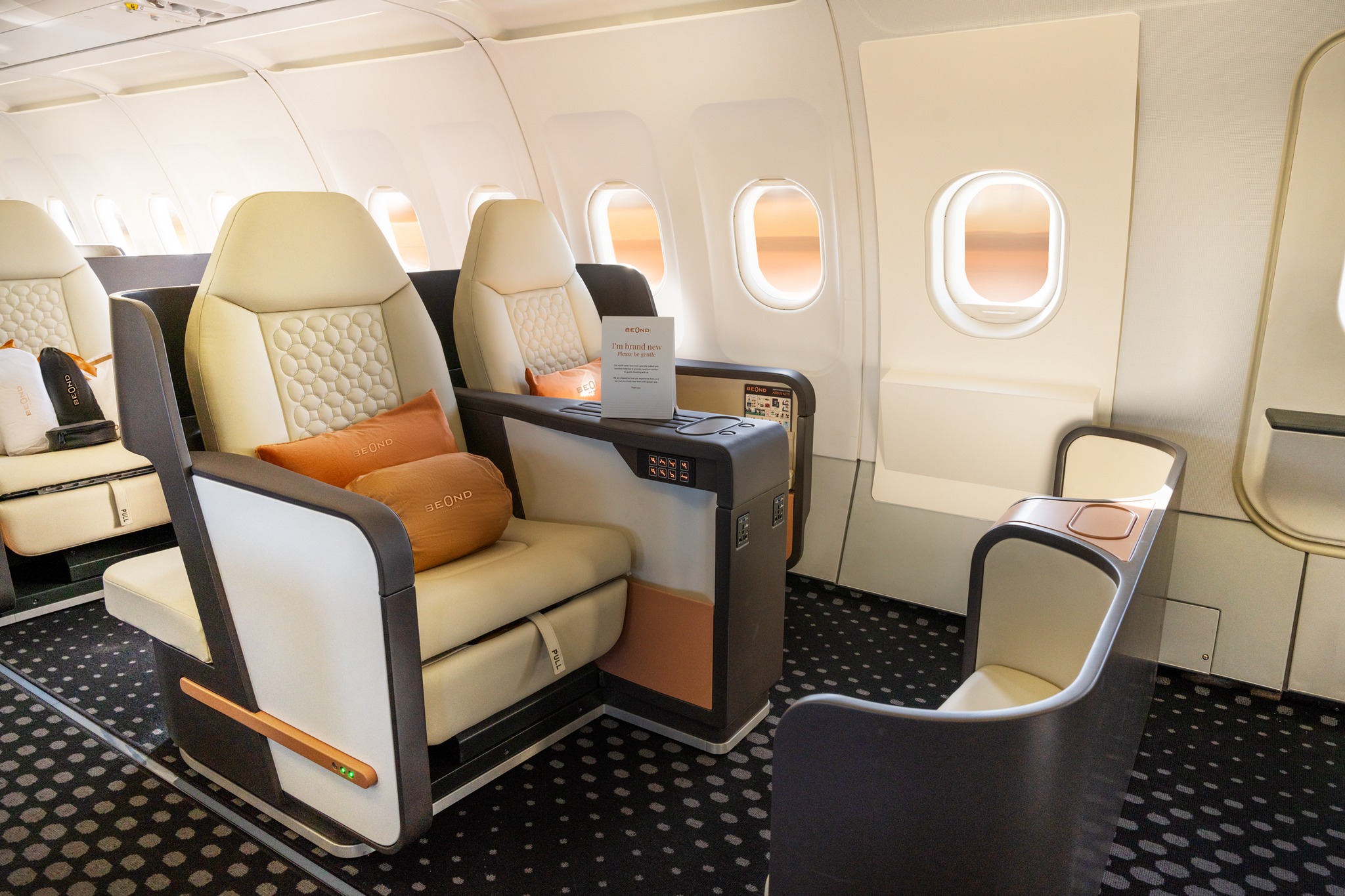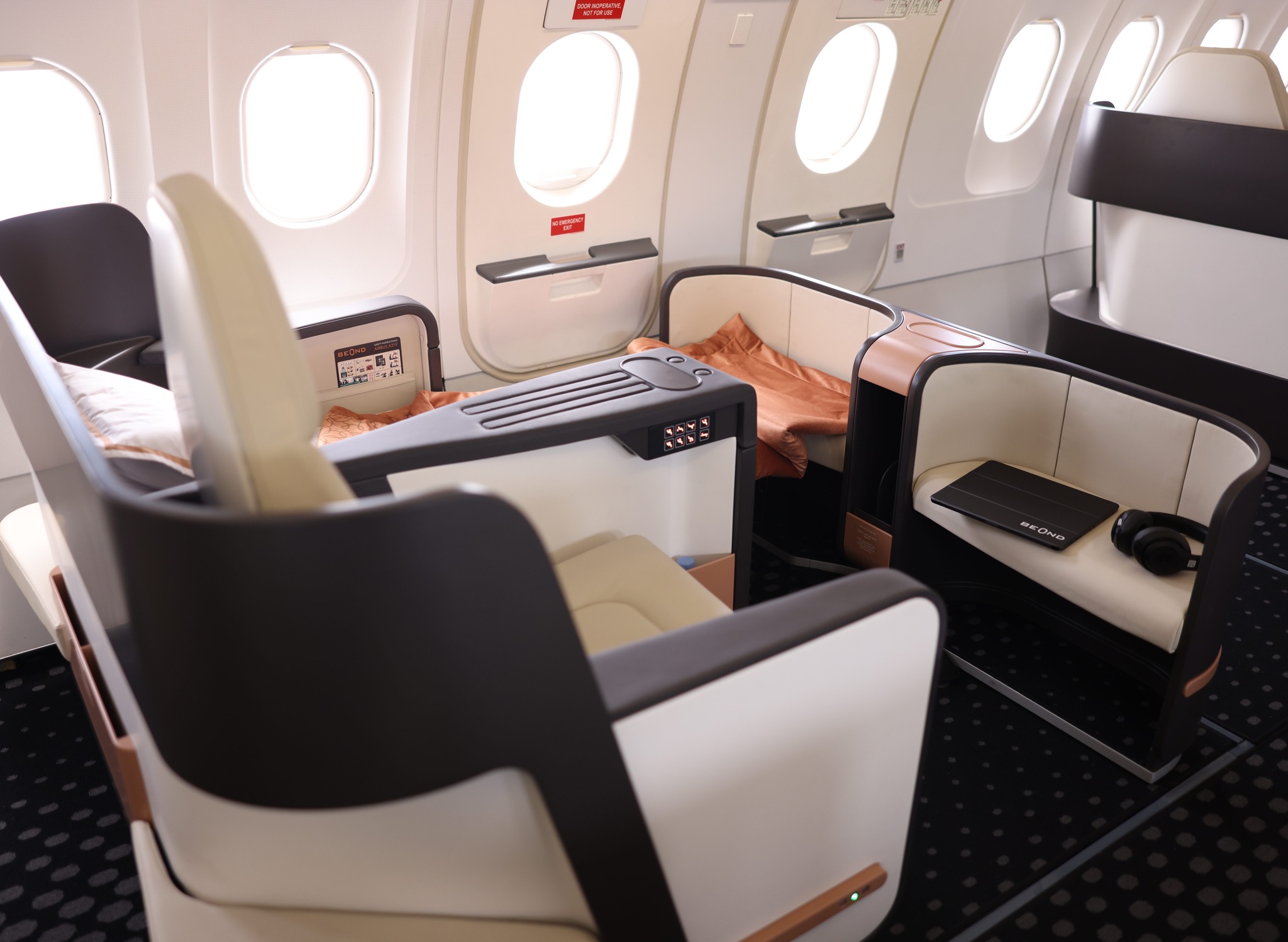I’ve covered new all business class leisure airline Beond a bit. It’s a new carrier based in the Maldives, flying to Europe and the Mideast. They’ve taken delivery of their second aircraft, and they have significant ambitions for growth.
I love premium products, and innovative ideas. So I’m rooting for Beond to succeed. But I’ve been skeptical of filling an all business class plane (most airlines go with a mix of products for a reason), based in a highly seasonal destination, operating only a few flights a week to each destination.
Fortunately on Thursday I had the opportunity to speak with the airline’s Chairman and CEO, Tero Taskila, to see whether he could turn around my skepticism.

Credit: Beond
Seasonality
If there’s a premium destination that might work for a small all-business class airline, it seems like it would be the Maldives. But the Maldives is very seasonal. May through November is south west monsoon rainy season. I can see filling up planes at very high fares December through March, but that’s only four months of the year.
Taskila offered two points to suggest that seasonality isn’t as big a problem for his model as I believe.
- Passenger volumes aren’t that seasonal, just average fares. While roundtrip business class fares can be two and a half times higher over peak Christmas than in the middle of July, passenger volumes only fluctuate by 8%. Lower fares stimulate demand.
- Seasons are different for Europe versus the Mideast. People travel to the Maldives in the off-season because while there’s frequent rain (for a bit of the day), it’s far nicer than Riyadh in the summer. These trips tend to be shorter, 3-4 days, and they expect to be able to fill 40 seat aircraft.
I have no doubt that it is possible to fill seats at some price when you’re offering a great experience. The question is whether that price will be high enough in the rainy season, and whether as they grow Gulf flights alone will be enough during that period.

Maldives In May

Maldives In May
Limited Schedules
Currently the carrier flies a single 44-seat Airbus A319 from Munich and Zurich to Male via Riyadh. They’ve added a second aircraft, an Airbus A321 which will be fitted with 68 lie flat seats. It’s expected to fly between the Maldives and Milan, Dubai and Bangkok later in the year. They’re generally offering a single flight to each destination, two to three times a week.
That works best for someone with flexibility over when they’ll travel, and will shift their travel dates to fly Beond. That doesn’t seem as compelling as flying an airline with daily service, especially because from Europe they’re having to stop (in Riyadh or Dubai) enrote.
Taskila told me that Europeans take long trips to the Maldives, where the specific travel dates often have flexibility. For instance, that the average German visitor spends 10.7 days on average in the Maldives and the average for a Swiss visitor is 7 days.
My skepticism should probably be tempered somewhat by the experience of U.S. airlines offering Saturday-only service to vacation destinations in Mexico and the Caribbean. With reduced demand for travel to U.S. cities on Saturdays, there are often available planes and gates and they make a trip to Cancun work. That always surprises me, that people don’t prefer to leave on Thursday or Friday and they cut their vacation a day short at the end not taking advantage of that last weekend day. But they do!
And while he wouldn’t disclose load factors, Taskila says that their “European markets are on the spot we want to be.” Surprising to me, just from the anecdotes I’ve seen in trip reports where flights have been quite empty, but those are just a handful of reports. And he says that “Riyadh is outperforming expectations.”
- Beond is still faster since they’re just making a tech stop for fuel, continuing passengers stay on board. They cut a couple hours off of comparable journey time.
- When they get their Airbus neos they’ll be able to serve Europe non-stop which will provide an even greater schedule advantage.
- And with a product seen as special, “people are willing to wait” for when they’re flying.
And they expect to grow and potentially add another seasonal hub, becoming more relevant for customers in Europe and an airline passengers become more exposed to and used to choosing.
Some passengers are already converting – for them the Maldives isn’t a once in a lifetime experience. There’s a Riyadh passenger who has traveled with Beond ten times, generally on 3 day trips visiting different resorts. And there’s a monthly Europe passenger as well.

Credit: Beond
Can Malé’s Airport Support Beond’s Growth?
The airline expects to operate 4 aircraft by the end of the year, so adding another two in 2024. They plan to add 8 more in 2025, and continue growing at 8 per year. They are “constrained by availability of aircraft, cabin crew, and pilots.”
My mental model of the Male airport is limited gates, just a single lounge, and very little space for parking aircraft.
A little over a year ago the airport increased its runway capacity. It used to be you couldn’t have two planes there at a time. That alone increases throughput at the airport.
Beond concedes that “terminal capacity has been an issue” but they’ve “been able to secure slots for 6 destinations” and the airport’s new terminal is coming. The “government talking about September, but realistically last quarter of the year.” They plan to build towards a 25 million passenger capacity at the airport.
Will They Have A Counter-seasonal Destination?
I still think that they’ll make their money December through March, and they’ll have to eke out the off season until cash starts coming in for peak season bookings. It’s the opposite of the problem that a low cost transatlantic airline has – they make their money in the summer and hope it’s enough to survive winter.
So I asked the Beond CEO whether there are counter-seasonal cities to focus on? I’ve wondered about Southern Europe in the past. He said that “Maldives is proof of concept and the crown jewel.” There’s no question, if there’s a premium leisure destination, this is top of the list. He suggested, though, that there would be more once Maldives works out and that seasonal destinations “become year-round destinations.”
They do this by working closely with major resorts. He says they aren’t subsidized, either by the Maldivian government or by any resorts. But Beond can sell packages with distressed inventory offering good deals in the off season that fill both properties and planes.
When they do take on another destination, he’d need a different air operator’s certificate. And they might then choose a different aircraft type, though they hope to stay all-Airbus for the lower cost and complexity that comes with fleet commonality.
What he doesn’t seem them moving to is ever operating dual class or three-cabin configurations. So a widebody aircraft would have to be fully business class, and filling 120-150 seats in business is tough (especially in the off-season!).
What surprised me is that he seemed to suggest that each destination would have its own dedicated fleet. While an airline based in Southern Europe would need a different “AOC” I assumed they’d lease planes from the first one. Move your fleet to the Maldives for November through April, then southern Europe for May through October.

Credit: Beond
Are They The “World’s First Premium Leisure Airlines”?
Beond promotes itself as “the world’s first premium leisure airline,” and that didn’t seem right to me. We’ve seen all business class airlines for years, like Maxjet and Eos. And we’ve seen all business class airlines focus on leisure markets. La Compagnie is a current product in the market.
So I asked how they distinguish other airlines to claim this moniker? Taskila explained that La Compagnie has a different product. They “attract business travelers as well,” and Beond’s cabin is designed with leisure passengers in mind. Their “cabin is open, designed for people traveling together.”
Regardless of whether they’ve created a new category, and can say they’re first, it’s a lovely idea that I hope works. They need to fill planes at high fares, and that should be possible if they can offer a convenient and reliable premium product with a schedule advantage. That’s going to take more planes, which gets more expensive. And then they’ll need a place to send those planes when business dries up as the destination gets wet. It’ll be a challenge, but I hope they make it and that I have a chance to fly them.
If you’re interested in flying them, the Beond website promotes promo code LOVE4IR valid for 24% off bookings made by February 14 for travel through December 15, 2024.


Any actual photos of the product or just renderings? It looks like the cabins really don’t have overhead bins. The livery looks pretty cool.
I was skeptical too but then I saw a review from someone who flew it and it looks insane. Wish Beond would expand to places other than Maldives.
https://planmoretrips.com/forums/discussion/beond-airlines-mle-muc-business-class-review/
“People travel to the Maldives in the off-season because while there’s frequent rain (for a bit of the day), it’s far nicer than Riyadh in the summer.”
Absolutely. I live in Minnesota, and we typically flee our brutal winters in late January or early February. (Well, not this year – it’s weirdly warm for us this winter.) If our “warm” destination is still kind of wintry by the destination’s standards, it’s usually still warm enough for us we may barely wear jackets. The Maldives in May may be rainy, but they also look to be significantly cooler. Even if it’s not as pretty as a postcard, it will still be a relief. (And if you are willing to splash out on boutique airfare, you can probably afford a nice resort, too, to make indoor days more tolerable.)
You live somewhere with extreme weather, any change down to something more moderate is nice. If it happens to be off-season at a warm-weather locale, then you get to escape your extremes to visit a location that’s probably still quite nice when it’s got less tourists.